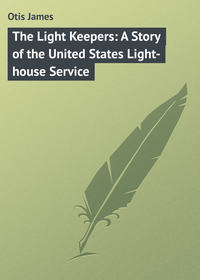 полная версия
полная версияDefending the Island: A story of Bar Harbor in 1758
"Can't we do anything toward putting out the blaze?"
"Nothing, unless we want the Indians to shoot us down before we can fire a shot."
"Then what is to be done?" and in her distress Susan leaped down from the platform to approach her cousin.
"Better stay where you are!" the lad cried, warningly. "I don't suppose it will make any great difference to us, and yet we should know if the Frenchmen come ashore after seeing the fire."
The girl returned immediately to her station, and even though he was at a considerable distance from her, Mark could hear the choking sob which escaped her lips.
"Keep up a stout heart, Sue; we can make a last stand inside the house."
"Ay, Mark; but it will be the last!"
The lad made no reply; he stood at some distance from the palisade as if trying to decide upon a course of action, and while he thus remained irresolute his mother came from the house.
There was no need that she ask for information; the blaze was so bright by this time that it must have been seen by those on the vessel, and Mistress Pemberton inquired in a low tone, but with no tremor in her voice:
"Are the logs dry?"
"Ay, mother; but it will be some time before the flames can eat in very deeply. We've got fifteen or twenty minutes yet."
"What is to be done?"
"We'll take refuge in the house, and shoot down as many as possible before the fire drives us out."
"If there is nothing more before us, why not come inside now? The Indians can climb up on the posts on either side and shoot you down while you stand here in the light."
"The Frenchmen are coming ashore!" Susan cried. "One boat-load has pushed off already!"
"We are going into the house," Mark said, hesitatingly, as if, even now, when prudence demanded that they should seek shelter as soon as possible, he was questioning whether he might effect something by remaining in the open.
"But if we don't stand guard the Indians will soon be over the fence," the girl cried, nervously.
"Ay, and if you stand there in the glow of the fire they can creep up under cover of the shadows to one side or the other, and shoot you down. We've done all we can here, Sue, and the remainder of our fight must be made from the house."
The report of a musket from the southern side of the stockade, and the humming of a bullet close beside Susan's head, gave emphasis to the lad's words, causing the sentinel to obey without further parley.
Once inside the dwelling, with the door strongly barred, the older members of the little party strove to appear unconcerned, each hoping to cheer the other, and at no time since the island was besieged did they display more courage than now, when there seemed no ray of hope remaining.
Through the crevices of the logs and the window-shutters could be seen the glow of the flames, which were increasing each instant, fanned as they were by short, furious gusts of wind which came from the gathering clouds.
"We must get under the roof, where I made the loopholes," Mark said to Susan and Luke. "There's no question but that the Indians will make a try at coming over the stockade before the fire has destroyed it, else they have changed their natures completely, and we won't give them full swing, even though we are cooped up here like rats in a trap."
"The boys want water," Ellen, who had been attending to the younger children, said, at this moment, and the elders of the party looked at each other in dismay.
The new danger which confronted them had driven, for the time being, everything else from their minds; but now all realized that, even though they might not be permitted to remain long in that frail refuge, they would suffer severely from thirst before the end came.
"Get into the loft, one on each side, and shoot with good aim if you see a painted face over the fence!" Mark cried, as he took up one of the buckets and went swiftly toward the door.
"You must not go out!" his mother said, as she barred the way. "It is certain by this time that the Abenakis are where they can have a view of the enclosure, and you will be shot down. Better that the children should suffer from thirst."
"We will all soon be needing something to drink, for it's bound to be hot inside here when the palisade catches fire. One bucketful of water will save us a good deal of suffering, and I'm bound to take the chances."
Then, before his mother could prevent him, Mark opened the door, running at full speed to the spring, which was not more than twenty feet distant.
That the Abenakis were on the alert could be told when half a dozen shots were fired in rapid succession; but, fortunately for the defenders of the island, not a bullet took effect, owing to Mark's rapid movements.
To those who were watching him in agonizing suspense from the house, it seemed as if the lad no more than wheeled about when he gained the spring, and then came toward the building in a zigzag course, well calculated to confuse the most skilful marksman.
He reëntered the house with a bucket two-thirds full of muddy water, and, while barring the door, once more said, in a tone of triumph:12
"I reckoned it might be done if a fellow used his legs well. That stuff doesn't look fit to drink; but after the mud has settled a bit it will be better than nothing. I am to blame for not cleaning the spring out when I first knew that the children had wasted the supply."
"You have nothing with which to reproach yourself, Mark," his aunt said as she laid her hand affectionately on his shoulder. "You have taken the place of both your father and uncle, and there is not a man grown who could have done more, or better, work."
The lad's face flushed with pleasure at this praise, but he affected to give no heed to the words as he clambered into the loft, musket in hand, calling out when he was on the timbers above:
"Give us the ammunition up here, and we'll load our own guns until the enemy comes too fast."
Mistress Pemberton handed him only a portion of the powder and bullets, after which she stood on the top of a table ready to take the empty weapons when the sharpshooters required her services.
Mark was the first to discharge his musket, and a cry of pain followed the report, telling that the ammunition had not been wasted.
"What did you see?" his mother asked, anxiously.
"An Indian's head over the top of the fence near the gate. There's one villain the less to trouble us!"
At this moment Susan and Luke both fired, the reports coming so near together as to sound like one, and the girl cried, triumphantly:
"I've hit another! What did you do, Luke?"
"I don't know; he went backward at the flash, like a loon; but it seems as if I must have struck him, for I had a fair aim."
Mistress Pemberton now had work to perform, for those in the loft soon learned that it would be impossible to recharge the weapons and at the same time keep close watch on what might be happening outside.
Seven shots had been fired from the dwelling, three of which were known to have found their targets, when a heavy pounding at the gate told of additional danger.
"What is it?" Mistress Harding cried, and Mark replied, quietly, as if it was of no especial consequence:
"The Frenchmen have come, and are battering down the gate."
"How long will it take them to do it?" Susan asked, her voice quivering despite all efforts to render it steady.
"It will be a good half-hour's job, with what timber they can pick up near at hand. If they should cut down a stout tree, the work might be done in half that time. Keep your eyes on the top of the fence, for if one fellow gets inside he might succeed in pulling out the bars before we could stop him."
Twice more the children fired, and then it was as if the Abenakis had tired of a game at which they were rapidly being worsted without an opportunity to inflict any injury.
"They've made up their minds to wait till the gate is down," Mark said, grimly. "We must have all the muskets ready when the rush comes, and shoot with good aim, for it will be our last fair chance."
All this while the flames had been increasing in volume, and the heat inside the dwelling, filled with the smoke of burning powder as it was, seemed stifling.
The younger children had drank of the muddy water eagerly, giving no heed to its disagreeable appearance, and the older members of the little company were already suffering with thirst; but never one of them ventured to claim a portion of the scanty supply.
"The fence is on fire," Mark said as he left his station at the front of the loft to survey the scene in the rear. "The wind is getting up in great shape, and coming from the east, otherwise these housed would be on fire by this time."
"There goes the upper part of the gate!" Luke cried. "Two or three more fair blows, and the whole will be down!"
Mark came back to where he could overlook the scene of what he believed would be the final struggle, and the three children crouched, muskets in hand, ready to empty the six weapons before the enemy could approach the house sufficiently near to find shelter under its walls.
The two women were standing on a table, where they could reach the weapons when they were empty. In one corner of the room, seated on a bed which was laid on the floor behind the barricade of the door, were the other children, some crying for water, and others weeping with fear.
The powder smoke hung heavily in the small apartment, which was illumined by the glow of the flames, now not more than thirty feet distant, and the heat was almost overpowering.
The bucket in which Mark had brought the muddy water from the spring, was empty, and the throats of the three children in the loft were literally parched with a thirst that could not be allayed.
They were beset by danger on every hand, and the supreme moment seemed very near, for once the gate was demolished, however desperately they might fight, the end was come.
"We are not to leave here alive," Susan whispered softly in Mark's ear, and he replied, pressing her hand:
"That part of it sha'n't be forgotten, Sue dear."
A cry from Luke; the crashing and splintering of wood; a shock which could be felt by the refugees as the heavy timbers fell inward, and the passage was open to the foe.
"Take good aim!" Mark shouted. "Shoot at the foremost, and work quickly!"
While one might have counted ten the enemy hung back as if fearing that a party of women and children might have planned an ambush, and then with a yell of triumph, the opening in the palisade was filled with armed men.
The defenders in the loft fired at almost the same instant; then, delaying only sufficiently long to fling back the empty weapons and take up those that were loaded, three more reports rang out.
The Frenchmen halted irresolutely for an instant, as four of their number fell to the ground, and had the children been able to fire one more volley immediately, it is quite certain the entire party would have beaten a retreat even at the moment of victory.
As the men, recovering courage, dashed forward, a heavy peal of thunder seemed to shake the very earth, and on the moment rain fell in torrents, coming as suddenly and in such volume as if having been poured from some immense reservoir.13
The enemy recoiled as if confronted by an overwhelming force, and as they wavered the children in the loft discharged three muskets, each bullet seemingly taking effect.
Then, suddenly, it was as if a black mantel had been dropped over the terrible scene. A certain portion of the enormous downpour of water was converted into clouds of steam by the flames, which were literally beaten down, and those who had struggled so bravely to defend the island could distinguish nothing.
"What is the matter?" Ellen cried in alarm at thus being suddenly plunged into profound darkness, and the younger children screamed with terror.
A deafening peal of thunder seemingly came in answer to the question followed a second later by a vivid, blinding flash of lightning which illumined the interior of the loft through the few crevices between the logs, until the defenders could see each other's faces gleaming ghastly pale.
The water trickling through the roof restored them to their senses somewhat, and Mark said, speaking as if with an effort:
"The storm has been gathering since afternoon. Now, while we are cooped up here in the darkness, the enemy can work his will!"
Again the crashing of thunder drowned all other sounds; once more the jagged rifts of unearthly fire, breaking though the clouds, illumined the scene, and Susan cried, as if unable to believe her own statement:
"The men are running away! They are running away!"
Mark and Luke sprang to her side, waiting for another flash of lightning, and when it came, preceded by crashing thunder which caused the house of logs to tremble, the enclosure was deserted.
"It's true that some of them have gone; perhaps all," Mark announced; "but the whole crew will come back when the storm is over, and there will be nothing save our muskets to prevent them from marching in at their pleasure."
"Let us give thanks for the mercies which have already been bestowed upon us," Mistress Pemberton said, devoutly. "The fire is extinguished, and we need no longer fear being burned to death."
"That might not be the worst that will befall us," Mark thought, recalling to mind the fate of those settlers of Maine who had been put to death by torture.
Because of the fury of the tempest, it seemed as if its force must be quickly spent, and the besieged waited in painful suspense, fearing that the downpour of water would speedily cease; but the moments went by amid the flashing of lightning and crashing of thunder, without any abatement of the tempest, save as the wind lulled for a few seconds to come in yet more spiteful gusts.
When half an hour had passed, Mistress Pemberton insisted that the three children should come down from the loft in order that they might all be together during this respite from the cruel foe, and when they were in the room below, freed from the fear of immediate death, thanks were given to Him who "ruleth the tempest" for this new lease of life, brief though it might prove to be.
CHAPTER VI.
THE WRECK
Hope once more sprang up in the hearts of those who had been so sorely tried, when the storm continued with greal fury. The electrical portion of the tempest appeared to have passed away, leaving the raging wind and pelting rain to guard the settlers who of a verity had descended into the very valley of the shadow of death.14
When it was understood that that which was at first supposed to be a summer gale had developed into a furious northeast storm, giving no token of subsiding, Mark said as he rose to his feet:
"When the rain first came it seemed as if my throat was parched dry with thirst, and now that water is to be had in abundance, all hands of us appear to have forgotten that we wanted a drink."
"We might catch some of the water that is finding its way through the roof," Mistress Pemberton said as if such a possibility had never occurred to her before.
"We can do better than that, mother dear. I'll go to the spring for a full bucket, and when it has been strained we shall have what will be an improvement on rainwater."
"But possibly some of the enemy may be lurking outside," Mistress Harding said, becoming timorous once more, now that the imminent danger had passed.
"Whoever has been out in the storm all this while will be harmless, aunt, for his musket would be filled with something other than powder," Mark replied with a laugh, and then he unbarred the door, surprised to find that it was only with difficulty he could make headway against the furious blasts.
So powerful was the wind that it became necessary for Susan and Luke to unite their strength in order to close the door while Mark was absent, and when he returned with a brimming bucket of discolored water, the three had no little difficulty in putting the bars into place again.
"It is the fiercest storm I ever saw!" Mark exclaimed as he dashed the rain-drops from his face. "We'll pray that the Future Hopes is in a snug harbor, otherwise she will have to scud, for I don't believe they could heave her to."
"Do you think there is any probability your father and uncle may be out in this tempest?" Mistress Pemberton asked, more anxious now for the safety of the absent ones then she previously had been concerning herself.
"They are too good sailors, mother dear, to take many chances, and we had fair warning of this storm. If we hadn't been in such sore straits, there's no question but that we would have been prepared for it. I noticed the clouds gathering, but at the time thought only that it would be our misfortune, since we could not keep watch of the Indians. Close-reefed, and with plenty of sea-room, the Future Hopes will ride out this gale without doing more harm to herself than the straining of a seam, perhaps."
"The Frenchmen could not have had time to get their vessel under way," Mistress Pemberton said as if thinking aloud, and Mark sprang to his feet in excitement.
"Of course they couldn't, and it is well for them if they didn't succeed in getting on board, for the craft never had been built that can ride at anchor to the eastward of the brook while the wind is so heavy. It would have been impossible to get under way, for she'd be on the rocks before her nose could be brought around into the wind!"
"Do you suppose they are yet on the island?"
"I think, unless all hands are good sailors, that they'd try to get on board, and that could have been done because the sea wouldn't grow heavy in an instant."
Further speculation as to the fate of their foes was checked very suddenly by what sounded like the groaning of a human being in deepest distress, coming from one corner of the room in which they were seated.
Instinctively the inmates of the dwelling clutched each other, for it was impossible to see anything in that profound darkness, and during many seconds no one spoke.
Then the dismal sound could be heard once more, and Mark, forcing himself to beat down the fear which assailed him, said, with an effort:
"Can you find one of the candles, mother? Some one here must be dying. Where are the children?"15
"Johnny and Jimmie are with me," Ellen said, and Mary added:
"I'm here with Luke."
"No one could have got inside without our knowing it," Mistress Pemberton said, as she groped around for the scanty store of candles, which were reserved for use on especial occasions.
Mark did not reply until his mother succeeded, after many fruitless efforts, in striking a spark from the steel and flint on the tinder, and as the feeble flame of the candle flickered and flared in the wind which made its way through the crevices, the lad began to tear away the barricade of household goods which had been thrown up to screen the window.
"It is useless to search there," Mistress Pemberton said, quickly, as if a sudden thought had come to her. "One of those whom you wounded is lying outside, and we hear his moans because he is close beside the building."
Mark was at the door in an instant, forgetting that he was hastening to the succor of one who, a short hour previous, was bent on killing him, and Susan seized the lad by the arm, as she said in a tone of caution:
"It may be some trick to get you outside. Be careful what you do; we have heard that the Indians often make use of such means to get a victim in their clutches."
"I'll warrant there is no Indian living who could stay out in this storm an hour or more, and then be able to do very much mischief," Mark replied as he unfastened the bar, waiting only long enough for Luke and Susan to get hold of the door, lest it should be torn from its hinges by the wind, before he darted out into the blackness.
A moment later it was possible to hear his voice, as if he spoke to someone, and then all was still, save for the raging of the tempest, until he cried from the outside:
"Open the door, youngsters. I've got a Frenchman here, who must be very near death!"
Then, as Luke and Susan gave him admittance, he came staggering into the room with an apparently lifeless body in his arms, while Mistress Pemberton shielded the candle as best she might, lest the wind extinguish the feeble flame.
Mark laid his burden on the bed, heeding not the fact that the water was running from every angle of the stranger's garments.
Like Mark, the two women forgot that a bitter enemy was before them; but with gentle care set about ministering to his wants, if, indeed he would have any more in this world.
Now all the occupants of the dwelling were too much engrossed with the work of saving the life which had so nearly been taken by one of their number to be able to tell whether the storm was yet raging, or if the morning had come.
In a very short time it was learned that the man lived, although how he survived after being exposed to the fury of the tempest so long, could not be understood. He had an ugly-looking wound in the thigh, and another in the left breast; but Mistress Pemberton gave it as her opinion that he was not mortally hurt.
"With good nursing, I doubt not but that he will live," she said, as she dressed the wounds to the best of her ability. "But if he does, what shall we do with him?"
"There is no need to answer that question now, mother dear," Mark said, gently. "We'll try to pull him through, even if we have already done our best to kill him, and then he'll know what it is to have coals of fire heaped on his head; that is," he added, after a brief pause, "if his comrades allow us to live long enough to do the job."
A fire was built, tea of herbs made and administered to the sufferer, and before morning came it was possible for him to speak.
He was sufficiently acquainted with the English language to make them understand him, and his first words were expressive of surprise.
"Save when you attack us without cause, we have no desire for your death," Mistress Pemberton replied. "Now you are no longer a soldier, striving to do us grievous injury, but a suffering fellow creature, and so long as it is in our power we will do whatsoever we may toward giving you aid."
The wounded man turned his face away, as if ashamed to look the good woman in the face, and after a time Mark questioned him as to how the chanced to be so near the house.
From his story, told little by little because of the difficulty experienced in talking, the facts were soon known.
He had been among the first to burst through the gate, and was not wounded until when the last shot was fired. Then instinct prompted him to gain a shelter under the wall of the building, where it would not be possible for those on the inside to see him, immediately after which he lost consciousness. During a long while he remained as if dead, and it is probable that the deluge of rain served to revive him after a time; but he was ignorant of having made any outcry. He remembered of realizing that he was alone, exposed to the storm, and the next knowledge was that the women were striving to nurse him back to life.
It was morning before the inmates of the dwelling gave much heed to anything save the wounded soldier, and then Mark, after cautioning the remainder of the family to stay inside the dwelling unless they heard his cry for help, ventured out into the tempest, which continued with but little decrease of violence.
The sun had not yet risen, and it the gray light of early dawn it was not possible to distinguish objects at any great distance. He had, in the immediate vicinity of the stockade, however, good proof of the violence with which the storm raged.
A portion of the palisade itself had been overthrown, leaving an opening through which the entire force of the enemy might have marched shoulder to shoulder. Trees were uprooted; the small boat, which had been drawn beyond reach of the tide, was now within ten feet of the battered gate, having been carried there by the wind.
That the buildings within the stockade remained un-injured was due, doubtless, to the thicket in the rear which served to shield them from the full fury of the elements.
Turn where he might, the same scene of devastation met his gaze, and he understood that if any of the Frenchmen remained on the island they would be powerless to depart, for their vessel could not have outlived the night.









